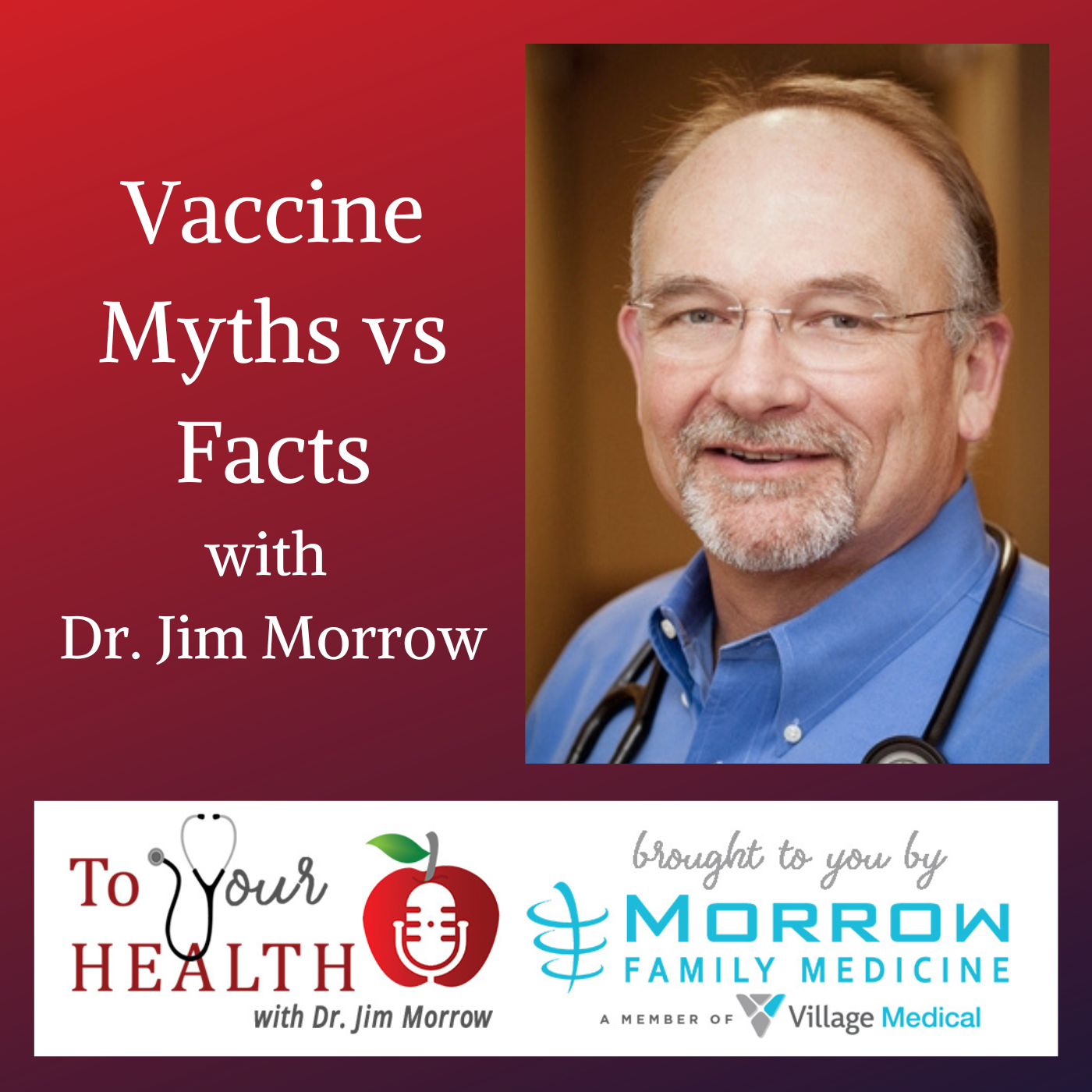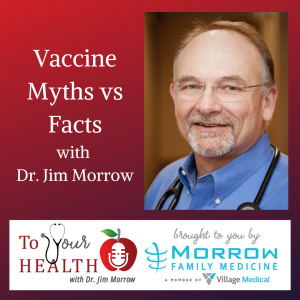
Vaccine Myths vs. Facts (Episode 84, To Your Health with Dr. Jim Morrow)
On this episode of To Your Health, host Dr. Jim Morrow of Village Medical addresses some of the most common myths surrounding vaccines, including myths like vaccines aren’t safe, they don’t work, and that vaccines cause autism spectrum disorder. He also mentions the Georgia Registry of Immunization Transactions & Services (GRITS) as a resource to track immunization records.
To Your Health is brought to you by Village Medical (formerly Morrow Family Medicine), which brings the care back to healthcare.
About Village Medical (formerly Morrow Family Medicine)
Village Medical, formerly Morrow Family Medicine, is an award-winning, state-of-the-art family practice with offices in Cumming and Milton, Georgia. The practice combines healthcare information technology with old-fashioned care to provide the type of care that many are in search of today. Two physicians, three physician assistants and two nurse practitioners are supported by a knowledgeable and friendly staff to make your visit to Village Medical one that will remind you of the way healthcare should be. At Village Medical, we like to say we are “bringing the care back to healthcare!” The practice has been named the “Best of Forsyth” in Family Medicine in all five years of the award, is a three-time consecutive winner of the “Best of North Atlanta” by readers of Appen Media, and the 2019 winner of “Best of Life” in North Fulton County.
Village Medical offers a comprehensive suite of primary care services including preventative care, treatment for illness and injury, and management of chronic conditions such as diabetes, congestive heart failure, chronic obstructive pulmonary disease (COPD) and kidney disease. Atlanta-area patients can learn more about the practice here.
Dr. Jim Morrow, Village Medical, and Host of To Your Health with Dr. Jim Morrow
 Dr. Jim Morrow is the founder of Morrow Family Medicine. He has been a trailblazer and evangelist in healthcare information technology, was named Physician IT Leader of the Year by HIMSS, a HIMSS Davies Award Winner, the Cumming-Forsyth Chamber of Commerce Steve Bloom Award Winner as Entrepreneur of the Year and he received a Phoenix Award as Community Leader of the Year from the Metro Atlanta Chamber of Commerce. He is married to Peggie Morrow and together they founded the Forsyth BYOT Benefit, a charity in Forsyth County to support students in need of technology and devices. They have two Goldendoodles, a gaggle of grandchildren and enjoy life on and around Lake Lanier.
Dr. Jim Morrow is the founder of Morrow Family Medicine. He has been a trailblazer and evangelist in healthcare information technology, was named Physician IT Leader of the Year by HIMSS, a HIMSS Davies Award Winner, the Cumming-Forsyth Chamber of Commerce Steve Bloom Award Winner as Entrepreneur of the Year and he received a Phoenix Award as Community Leader of the Year from the Metro Atlanta Chamber of Commerce. He is married to Peggie Morrow and together they founded the Forsyth BYOT Benefit, a charity in Forsyth County to support students in need of technology and devices. They have two Goldendoodles, a gaggle of grandchildren and enjoy life on and around Lake Lanier.
The complete show archive of To Your Health with Dr. Jim Morrow addresses a wide range of health and wellness topics.
Dr. Morrow’s Show Notes
Vaccine Myths vs Facts
- There are many common misconceptions regarding vaccines.
- If you find yourself trying to decide if you’re for or against them, here is some evidence-based information offered to clear up any confusion.
Myth: Vaccines don’t work.
- Fact: Vaccines prevent many diseases that used to make people very sick.
- Now that people are being vaccinated for those diseases, they’re not common anymore.
- One example is measles. It used to be a serious respiratory illness that affected children.
- But once the vaccine was developed and people got immunized, it’s almost completely eliminated.
- A vaccine helps your body build immunity to a particular disease.
- Immunity means you’re protected from getting the disease.
- In order for them to work properly, vaccines need to be given at certain times.
- That’s because some vaccines take a few weeks or months to create immunity in your body.
- Therefore, you and your children should get all vaccines per the schedule provided by your doctor.
- Immunity means you’re protected from getting the disease.
Myth: Vaccines aren’t safe
- Fact: The safety of vaccines is important, from beginning to end.
- When a vaccine is developed, it goes through a strict and detailed process overseen by the U.S. Food & Drug Administration (FDA).
- The FDA must prove the vaccine is safe before it can be given to people.
- Vaccines go through many testing phases before they’re given to people.
- This includes testing on thousands of people and careful analysis of the test data by scientists.
- Once the FDA decides a vaccine is safe for people, the Centers for Disease Control and Prevention (CDC) joins the FDA in continuing to monitor the vaccine as it’s given to people.
- They watch for many things, including how well it works and what side effects happen.
- In addition to watching vaccines, the CDC and FDA monitor the facilities where the vaccines are made.
- They do this to make sure the vaccines are being produced safely.
- The two groups also check each batch of vaccines before they’re distributed to the public to make sure they’re safe.
- If you have questions about vaccine safety, talk with your doctor. Ask to see the CDC’s Vaccine Information Sheet for information about each vaccine.
Myth: I don’t need vaccines. My natural immunity is better than a vaccination.
- Fact: Many preventable diseases are dangerous and can cause lasting side effects.
- It’s much safer—and easier—to get vaccines, instead.
- Plus, being vaccinated helps keep you from spreading the disease to unvaccinated people around you.
Myth: Vaccines include a live version of the virus.
- Fact: Diseases are caused by either bacterial or viral infections.
- Vaccines trick your body into thinking you have the infection caused by a particular disease.
- Some vaccines contain a pretend version of the infection.
- But your body thinks it’s the real infection.
- It wants to protect itself from the infection, so it creates antibodies to attack it.
- Antibodies are infection fighters that live in your blood.
- After your body rids itself of the pretend infection, the antibodies remember how to fight the real infection.
- This makes you immune against the disease.
- Other vaccines contain live versions of the bacteria or virus that causes the disease.
- However, those infections have been so weakened during the vaccine creation process that they can’t make you sick with the disease.
- But your body fights the infection as if it’s the strong version of the infection.
- This creates immunity, too.
Myth: Vaccines have negative side effects.
- Fact: Side effects can be common with vaccines.
- In fact, your doctor may tell you to expect minor side effects.
- However, the benefit of getting vaccines outweighs the possibility of side effects.
- Possible common side effects include
- pain,
- redness, and swelling near the injection site;
- a low-grade fever of less than 100.3 degrees;
- a headache;
- and a rash.
- Severe side effects of vaccines are rare.
- If you experience a severe issue after getting a vaccine, let your doctor know right away.
Myth: Vaccines cause autism spectrum disorder.
- Fact: There is proof that vaccines do not cause autism.
- A study published more than 20 years ago first suggested that vaccines cause the disability known as autism spectrum disorder.
- However, that study has been proven to be false.
- Researchers have studied vaccines and autism and haven’t found anything that links the two.
- Instead, scientists have found a gene that’s linked to autism.
- That means children with autism have had the gene for it since birth.
- Timing may be behind why people believe vaccines and autism are related.
- Some children begin to show signs of autism spectrum disorder around the same time they receive the vaccine for measles, mumps, and rubella.
- A study published more than 20 years ago first suggested that vaccines cause the disability known as autism spectrum disorder.
Myth: Vaccinations aren’t safe to get while pregnant.
- Fact: Actually, the opposite is true.
- The CDC recommends pregnant women get the vaccine for diphtheria, tetanus, and whooping cough.
- Additionally, if the woman is pregnant during influenza season, it’s recommended she get the flu vaccine, too.
- These vaccines can protect the mother—and the baby.
- A baby develops immunity when their mother gets a vaccine.
- And vaccines can protect the baby for a few months after they’re born.
- This is especially important because newborn babies don’t have fully developed immune systems.
- If they become sick, it can be very serious.
- However, the immunity a baby gets from their mother only lasts for a few months after birth.
- That’s why it’s important your baby receives all suggested vaccinations from your doctor.
- The CDC recommends pregnant women get the vaccine for diphtheria, tetanus, and whooping cough.
Myth: I don’t have to tell anyone if I choose to not vaccinate my child.
- Fact: If you choose not to vaccinate your child, you need to tell certain people.
- These include your doctor and other medical professionals.
- They need to know so they can best determine how to care for your child if they become sick.
- Additionally, your child’s daycare, school, or babysitter should know.
- Vaccines are required for many activities.
- Not having the appropriate vaccine can interfere with your plans. These instances include:
- These include your doctor and other medical professionals.
- School (K-12 and college dorm life)
- Travel
Questions to ask your doctor:
- Can I delay a vaccine?
- Can I get a disease after I’ve gotten the vaccine?
- What should I do if I don’t have health insurance, or my insurance doesn’t cover vaccinations?
- What vaccinations do I need as an adult?
- How do I know if I had certain vaccines as a child if I don’t have the records?
- Is my newborn at risk of certain diseases if he or she isn’t old enough to get certain vaccines?
Credit: www.familydoctor.org















